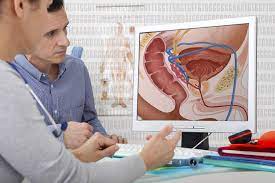What is prostate gland
Your prostate is like a tiny walnut.
The location of this is below the bladder and in front of
the rectum. The primary function of this organ is
to generate seminal fluids and circulate the sperm through
the bloodstream during ejaculation. Your
prostate will probably get bigger as you get
older, which is normal.
Prostate on the bladder is something that men over 60 should be aware of.
Around 50% of men experience bladder weakness due to an
enlarged prostate at this stage. In the vicinity age of 85, these symptoms appear in
almost all men.
As a result of prostate growth, the
bladder shrinks and urinary tracts are
placed under pressure, leading to urinary
Problems the condition is called benign prostatic hyperplasia,
which occurs when a man's prostate gland enlarges with
age. Scientists do not know exactly why this happens.
Perhaps it's due to hormonal fluctuations. Men who are
overweight, inactive and have a family history may be
at greater risk.
Symptoms of an enlarged prostate
This can hinder the entry of urine into the
bladder and cause it to be re-entry. Its
symptoms are e.g
1.
The need to urinate more
frequently
2.
Getting up frequently at
night to urinate
3.
Weak flow of urine or
excessive flow
4.
There may be difficulty in
starting or stopping urination
5.
Feeling as if the bladder
is full even after urinating
Treatment and cure
You can do nothing if you
have any of these symptoms and they are not serious.
By conducting tests
to determine the size of your bladder, your
doctor can rule out the possibility of cancer or
a severe infection. The
doctor can also examine the prostate
through the rectum.It is also called digital test. If everything checks out, the
wait-and-see procedure can fix it. If your symptoms are bothersome or getting
worse, options can range from medications to minimally invasive procedures and
even surgery. Medicines used to treat benign prostatic hyperplasia require a
prescription. Bladder treatment options include
Alpha blockers
These drugs can be taken orally to ease muscle tension around the prostate. It improves the flow of urine. They
do not shrink the prostate. Side effects may
include headache, dizziness and ejaculation problems.
Drugs that shrink the prostate
If you have a severely enlarged prostate, your doctor
may prescribe one of these drugs. It
reduces the size of the prostate. Side effects
may include erectile dysfunction and ejaculation problems.
A minimally invasive procedure
Various techniques exist to decrease prostate gland volume. First, the doctor inserts a
scope, probe or catheter into the penis and through the urethra to
reach the prostate gland. By
transmitting microwave energy
through a tube, transurethral microwave
therapy can effectively reduce the size of the
gland.
Radiation is achieved through transurethral needle
ablation using radiofrequency energy. Laser therapy
uses steam-producing energy.
Transurethral surgery.
The procedure most commonly used for prostate
enlargement is this one. However, surgery
is usually not recommended
unless all else fails. This involves
inserting a scope through the
penis.The physician then attaches an electrical loop to the
scope and cuts through the tissue in the center of the prostate.This
surgery is more effective than all other procedures except complete removal of
the prostate gland. The complication rate is low. But, it is known to cause
erectile dysfunction.
Open surgery
A man with an enlarged prostate may need to have the core of the
gland removed through an incision in the lower abdomen. This surgery greatly
improves the flow of urine. Patients often require a short hospital stay. A
possible complication can be bleeding.
Cranberry supplements for prostate health
Cranberry sachet for prostate gland
A shrub with
evergreen growth, the bilberry can be found in North America's swampy regions. It produces dark red fruits containing salicylic
acid; the chemical compounds in cranberries are effective in stopping
bacteria from attaching to the cells of the urinary tract. The bacteria that
already have colonized these cells cannot be eliminated by them. This may
explain why cranberry helps prevent urinary tract infections (UTIs) but not
cure them. People commonly use cranberries to prevent UTIs.
Cranberry is also used for kidney stones, enlarged prostate, the common cold,
and many other conditions, but there is no good scientific evidence to support
these uses. Cranberry was used as a remedy for urinary tract symptoms in men
with BPH and prostitutes, according to research published online in the British
Journal of Nutrition. For a period of six months, 21 men were given 1,500 mg of
oxalis extract powder by researchers. Men were advised to avoid other foods
rich in phenolic compounds, such as blueberries, cherries and grapes. The 21
men in the control group were taught in the same way, but the control group did
not receive the cranberry extract. Those men who received the crab extract
after six months reported increases in both the frequency and volume of their
urinary tracts as well as their need for, frequency from, and strain when they
urinated. Quality of life indicators for men in this group also improved. The
men reported no side effects.

